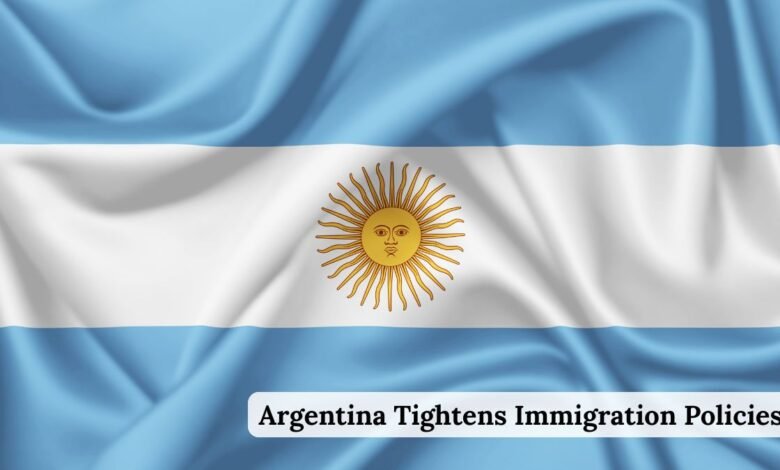Argentina Tightens Immigration Policies: Key Changes Affecting Entry, Public Services, and Citizenship

Argentina has enacted a number of restrictive immigration reforms in a major change to its traditionally open-door policy, with Decree of Necessity and Urgency (DNU) N 366/2025, signed on May 29, 2025. Proclaimed by President Javier Milei, these alterations are meant to tighten control of the border, reduce irregular migration, and reform access to public services by non-citizens.
The reforms mark the reaction of the government to political and economic pressures, and it is an indication of a new dawn to those intending to visit, study, work, or live in Argentina.
Although these measures have attracted criticism due to their alleged restrictive effect, they also usher in new possibilities, including a citizenship-by-investment program, which makes Argentina a promising destination to high-net-worth individuals.
Restricted Access to Public Services for Non-Citizens
Among the most influential reforms, a restriction of the public services to foreigners can be mentioned. Primary and secondary education will continue to be free to all but tertiary and university education will now only be free to Argentine nationals and permanent residents.
Without permanent residency, international students might be required to pay tuition fees in state universities, and that may considerably raise their living expenses. In the health care industry, emergency care continues to be provided to all, however non-citizens would now be required to show a valid health insurance cover, or pay out of their own pockets in receiving any other medical assistance.
Public healthcare is free only to permanent residents. Students and low-income migrants will probably be the most vulnerable to these restrictions because they might not be able to afford the private alternatives.
Stricter Entry and Stay Requirements
In the new decree, a number of entry and stay requirements are tightened. Every foreigner entering the country is now required to fill in a sworn statement of the reasons and the period of visit. Moreover, health insurance is also required at the port of entry. Immigration officers now have greater powers to refuse entry or to cancel visas because of providing false documents, concealing a criminal record or lack of a bona fide job offer.
The foreigners should also indicate a legal, physical, and email address when applying to reside and should notify within three business days in case of change of address. Such steps impose a heavier documentation load and enforcement hazards, especially on freelancers or home workers who do not receive conventional job offers.
Tighter Definition of Irregular Immigrants
Argentina is tightening down on Visa overstays and illegal work. The order makes inspections formal and adds to the reasons to deport, which now also comprise overstaying a visa, entrance without inspection, being in the country after being deported, and engaging in employment that is not covered by the terms of a visa.
Participation in criminal acts also results in automatic deportation including human trafficking. This clampdown poses more legal risks to foreign nationals and their employers, compliance with the conditions of the visa is the only way to ensure no penalties or expulsion can be imposed.
Tighter Rules for Permanent Residency
The permanent residency road has been made tougher. The new requirements are that the applicants should show evidence of financial resources and a clear criminal history.
Also, the family members of permanent residents, who used to get the same status in the past, currently, receive not more than three-year temporary residence.
Nevertheless, the children of Argentine citizens that are born in other countries can now officially apply to get permanent residency which is a nice twist to certain families. The changes can make long-term settlement plans of immigrant families challenging.
New Pathway to Citizenship for Investors
One of such additions is the citizenship-by-investment option. Foreigners who invest minimum USD 500,000 in the Argentine economy can also become eligible to citizenship, and additional information on how this will work is anticipated in the near future.
Also, the consecutive two years of residence is now the standard requirement of naturalization, increasing from the previous ones. Such a new route may turn Argentina into a new destination of high-net-worth individuals who need international mobility offered by citizenship, which may increase foreign investment in this country.
Context and Implications
The 2004 Immigration Law of Argentina was recognized to be inclusive in nature and offered equal access of the social services to the migrants. The new reforms however mark a strategic change to more controls, economic focus and national security issues.
The government wants to streamline the immigration as it controls the public resources better. These shifts can be possibly attributed to the economic pressures experienced by Argentina such as high inflation and fiscal deficits as well as political demands of doing something about irregular migration.
Argentina has received more than 1.7 million illegal immigrants in the last 2 decades and the current Milei government is trying to undo the mess by implementing tighter policies.
The government of President Javier Milei has been compared to the immigration policies of U.S. President Donald Trump, where opponents claim that the new immigration restrictions place a greater emphasis on enforcement rather than embracement.
The decree has stirred some controversy with critics saying it goes against the tradition of Argentina being open to immigrants. Its supporters however defend the reforms by saying that the reforms are meant to safeguard national interests and provide economic stability.
Even the nationals of Mercosur are not spared by the changes as they were given freer immigration provisions by the regional agreements in the past.
Final Thoughts
The transformation of immigration in Argentina creates a milestone in the life of foreigners. Although it offers new opportunities to high-net-worth individuals by bringing in the citizenship-by-investment program, it also poses problems to individuals who want to get an education, health services, and a long-term certainty at affordable rates.
The reforms have been viewed as a juggling act between economics and national security and have elicited controversy on whether it affects the inclusive legacy of Argentina. It will require careful planning, compliance and awareness of the new rules by anyone endeavoring to navigate in this new immigration landscape.


